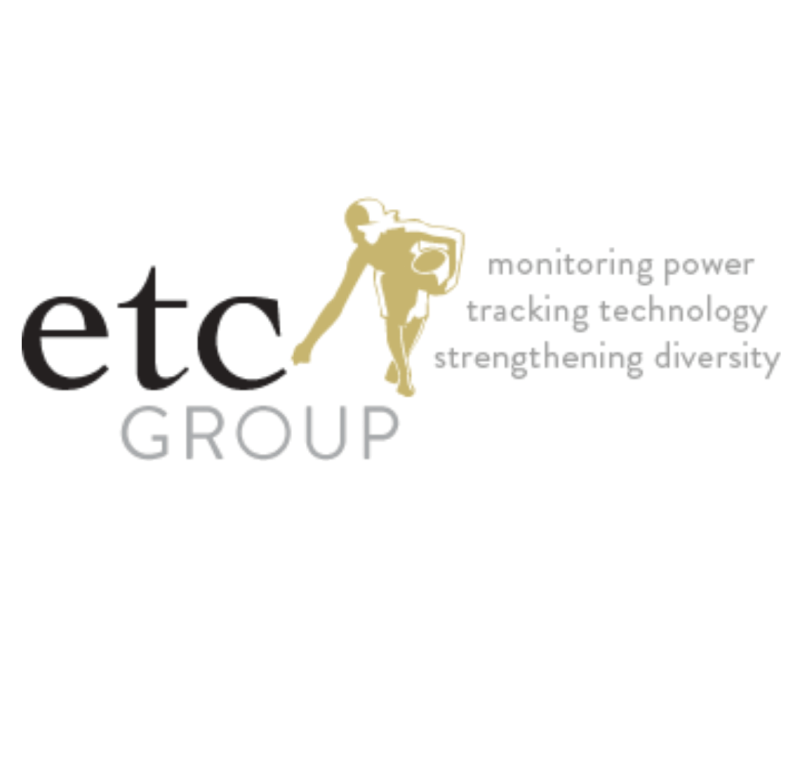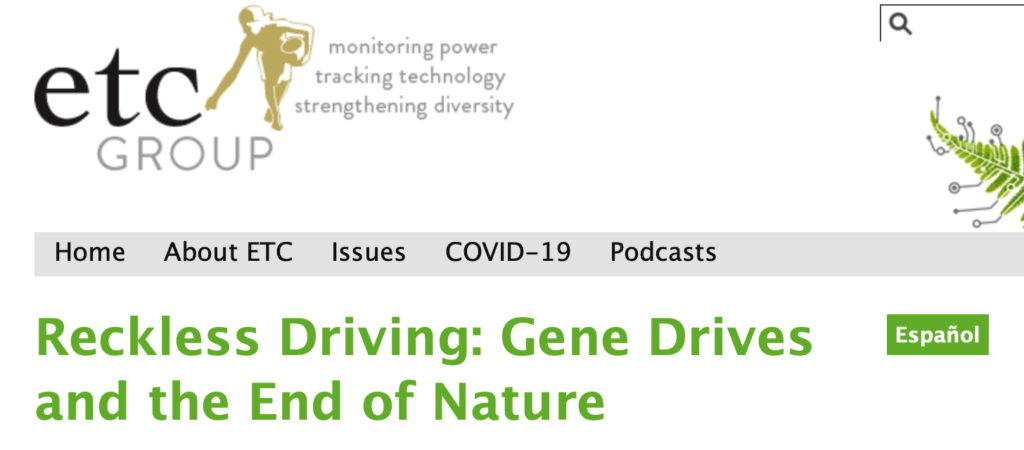The ETC group, an international NGO based in Canada, claims it monitors the “impact of emerging technologies” that impact biodiversity, agriculture and human rights. It promotes imposing an extreme version of the ‘precautionary principle’ to all technologies, claiming that many modern innovations, including genetic engineering of crops and medicines, are too risky to implement, and even basic research should be suspended indefinitely.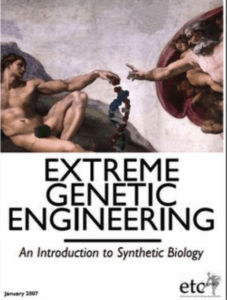
ETC Group works with other radical environmental groups such as Friends of he Earth, campaigning against nearly every application of genetic engineering, including biotechnology-based disease research, synthetic biology, and most aggressively gene drives, which it refers to as “extreme genetic engineering” an claims it will result in the “end of Nature.” ETC Group calls has criticized increased corporate involvement in food and agriculture, what it calls threats to biodiversity and farmers’ rights, and what it sees as insufficient government regulation.
“The speed with which those developments are scaling up is often presented in terms of carefully crafted speculative conservation and health benefits while the overwhelming military interest driving these developments, while not hidden, has been very much downplayed,” ETC Group co-executive director Jim Thomas has said, citing the military’s interest in synthetic biology.
ETC Group staff members are often quoted by major media outlets criticizing various applications of genetic engineering. The organization has used Freedom of Information Acts (FOIA) to obtain emails and background information on university and government research, which they provide to journalists.
The New York Times has written two articles based on information provided by the ETC Group raising questions about genetic engineering. In an article published in 2014, The Times raised questions about consumer products containing genetically engineered algae. The ETC Group partnered with Friends of the Earth, the Center for Food Safety, GM Watch, the Organic Consumers Association, Food & Water Watch, and other groups to write a letter requesting that two companies, Ecover and Method, “reconsider its decision to use ingredients derived from synthetic biology in its products.”
In 2017, it targeted Impossible Foods, a company that produces a plant-based burger, because it utilizes genetically modified yeast to make one of the burger’s ingredients. ETC Group, along with Friends of the Earth and other groups, obtained US Food and Drug Administration (FDA) documents that they claimed show that the agency was concerned about the burger’s safety.
“Impossible Foods should pull the burgers from the market unless and until safety can be established by the FDA and apologize to those whose safety it may have risked,” ETC Group’s Jim Thomas told the Los Angeles Times.
Nathanael Johnson, writing at Grist, criticized the ETC Group and the Times’ reporting, referring to the story as a “nothingburger”:
The activist organizations Friends of the Earth and the ETC Group dug up documents which they claim show that Impossible Foods “ignored FDA warnings about safety” — and they handed them over to the New York Times. The ensuing story depicted Impossible Foods as a culinary version of Uber — disrupting so rapidly that it’s running “headlong into” government regulators. In reality, Impossible Foods has behaved like a pedestrian food company, working hand in hand with the FDA and following a well-worn path to comply with an arcane set of rules.
Impossible Foods CEO and founder Patrick Brown also criticized the group:
The vast majority of their effort is an antiscience, anti-GMO crusade. Their strategy has tended to be to try to effectively take down any company that is using biotechnology by whatever means they can come up with.
Gene Drives
The ETC Group is the most aggressive advocacy group in the world opposed to gene drives, calling it a reckless and dangerous technology that could end life on the planet as we know it.
The ethical, cultural and societal implications of gene drives are as enormous as the ecological consequences. Civil society groups (and even some gene drive researchers) are alarmed by this newfound ability to reshape the natural world. However, such an omnipotent power to control nature is immensely tempting to those who may not be constrained by either common decency or common sense. Gene drive technology is commanding the attention of the world’s most powerful military, agribusiness, and social change organizations. Gene drive technology also appears to be relatively simple and cheap, so it could easily fall into the hands of those, including governments, who might use it as a weapon.
Scientists do not share ETC Group’s characterizations. Various research projects are under way to apply gene drive technology in areas of health, agriculture and environment. For example, the not-for-profit organization Island Conservation is researching how gene drives can be used to reduce the population of invasive species like rodents on islands. Target Malaria, a United Kingdom-based group, is also researching how to potentially use the gene drive technology to reduce the population of malaria-spreading mosquitoes.
ETC Group accuses the Gates Foundation of promoting “species extinction in its support of research into developing gene drives that could be engineered into disease-carrying mosquitoes and other pests to control a range of diseases, from malaria to Zika to dengue. Gene drives are being developed as an alternative to pesticides and other methods for combating invasive species for conservation and disease eradication purposes. In a caricature of the science, ETC Group calls gene drives:
…unproven technology designed to cause the virulent spread of a manipulated genetic trait through a population, literally driving a species to extinction by forcing a change through the sexual reproductive process.
The ETC Group, along with other groups known for their suspicion of technology, such as Friends of the Earth, have called for a moratorium on gene drive research, claiming that tit could have dangerous side-effects or be misused for military or terrorist purposes. In 2018, it partnered with dozens of other NGOs suspicious of technology to get the United Nations Convention on Biological Diversity to impose a moratorium on gene drive research, but failed. Dozens of scientists opposed the moratorium proposal, although numerous environmental and activist groups supported it.
“We are happy that we decided on something that will not strangle emerging technologies like synthetic biology, including gene drives,” said Eric Okoree, chief executive of Ghana’s biosafety authority. “Those restrictions were dissolved. That means there is the freedom and liberty to put regulatory systems in place in Africa and developing countries to regulate them and make a better use of those technologies. So it is good for Africa.”
In 2017, ETC Group obtained and published emails from gene drive researchers through a Freedom of Information Act request. The group claimed the emails reveal that the US Military’s research arm, the Defense Advanced Research Projects Agency (DARPA), is now the world’s largest funder of gene drive research. “Gene drives are a powerful and dangerous new technology — and potential biological weapons that could have disastrous impacts on peace, food security and the environment, especially if misused,” ETC Group co-executive director Jim Thomas told the Financial Times. “The speed with which those developments are scaling up is often presented in terms of carefully crafted speculative conservation and health benefits while the overwhelming military interest driving these developments, while not hidden, has been very much downplayed,” Thomas told Gizmodo.
Golden Rice
Neth Daño, who was working in the Philippines for the ETC Group at the time, told NPR in 2013 that the purpose of Golden Rice was not to help the poor but to improve the image of biotech companies.
A July 2016 article titled “Nobel laureates serving Monsanto and Syngenta” originally published in Mexico’s La Jornada, the ETC Group’s Silvia Ribeiro writes, “It is not often that so many prominent scientists reveal their ignorance on a topic in such a short space.” Ribeiro is refering to a group of 110 Nobel laureate scientists who penned a letter criticizing Greenpeace for its campaign against GMOs, specifically its effort to block Golden Rice. The letter states:
We urge Greenpeace and its supporters to re-examine the experience of farmers and consumers worldwide with crops and foods improved through biotechnology, recognize the findings of authoritative scientific bodies and regulatory agencies, and abandon their campaign against ‘GMOs’ in general and Golden Rice in particular.
The list has since grown to 131 Nobel laureates as the genetically modified rice variety high in provitamin A moves closer to commercialization in several Asian countries. Golden Rice could help combat vitamin A deficiency in Asia, a serious public health issue.
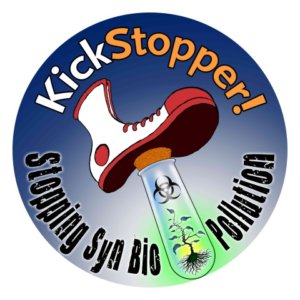 “Kickstopper” campaign
“Kickstopper” campaign
In response to a Kickstarter campaign by 3 synthetic biologists to raise money for a project to develop glowing plants, the ETC Group started a “Kickstopper” campaign. They launched a petition “Tell Kickstarter not to allow bioengineered organisms” that garnered over 13,000 signatures and solicited donations for “a long term campaign to stop the biohackers in their tracks.” The campaign raised over $2,000 on Indiegogo. In August 2013, Kickstarter amended their project guidelines to specifically exclude the offering of GMOs as donation rewards.
Human genetic issues
In the 1990s, the group’s focus expanded from agriculture and GMOs to include human genetic issues, such as “biopiracy,” human genomics and nanotechnology. The group says it was “one of the first organizations to warn of the downside of genetic engineering of crops and livestock and has since kept an eye on developments in human biotech, synthetic biology, biowarfare and industrial biotech.”
On synthetic biology, for example, ETC Group has called for stricter regulations, arguing: “Synthetic biologists, engaged in a kind of extreme genetic engineering, hope to construct designer organisms that perform specific tasks such as producing biofuels or other high-value compounds.” The group has even issued a comic book outlining these concerns, and argues that there is a lack of oversight of synthetic biology.
This is an oversimplification, wrote Andrew Porterfield, writing for the Genetic Literacy Project:
The actual field is nowhere near the stage of creating monsters in the lab; instead, most synthetic biology consists of sequencing and assembling existing genes and oligonucleotide sequences for experimentation. If such genetic engineering efforts do indeed mix or edit existing genomes, regulations do exist to monitor these developments, beyond the Precautionary Principle recommendations under the Convention on Biological Diversity, the 1992 United Nations treaty that covers a variety of biological issues, including the genetics use restrictions.
Campaign against New Breeding Techniques (NBTs)
The ETC Group is leading the charge against New Breeding Techniques (NBTs), such as CRISPR gene editing, which scientists say are easier, cheaper and more precise than first-generation genetic modification techniques and don’t require gene transfer between species (transgenics).
“If they don’t have to go through the regulatory requirements, then it is game on again for genetic modification in agriculture,” Jim Thomas of the ETC Group told MIT Technology Review in 2017. “That is the prize. They are constructing a definition of a GMO so that gene editing falls outside it.”
The group worries about the potential for gene-editing techniques to have “off-target” effects and says that gene-editing should be strictly regulated.
History
Originally formed in the late 1970s as Rural Advancement Foundation International (RAFI), the group changed its name to the ETC Group in 2001. Its official name is the Action Group on Erosion, Technology and Concentration.
ETC Group is a registered CSO in Canada and The Netherlands. Friends of ETC Group is a private non-profit organization under section 501(c)3 in the United States.
The group claims to be the “first civil society organization (nationally or internationally) to draw attention to the socioeconomic and scientific issues related to the conservation and use of plant genetic resources, intellectual property and biotechnology.”
According to the group’s website, “In the late 1970s, we were the first CSO to recognize the trend toward life patenting and the first to organize against national plant patenting laws (plant breeders’ rights).” In the 1990s, the ETC Group says its work “expanded to encompass social and environmental concerns related to biotechnology, biopiracy, human genomics and, in the late 1990s, to nanotechnology.”
The group says that it has “consultative and/or observer status” with:
- United Nations Economic and Social Council (ECOSOC)
- Food and Agriculture Organization (FAO)
- Conference on Trade and Development (UNCTAD)
- Framework Convention on Climate Change (UNFCCC)
- Intergovernmental Panel on Climate Change (IPCC)
- Convention on Biological Diversity (CBD)
Consultative Group on International Agricultural Research (CGIAR).
On December 16, 2010, the Presidential Commission for the Study of Bioethical Issues released a report that recommended self-regulation by synthetic biologists, stating that the infant technology posed few risks to society. This decision was strongly opposed by Jim Thomas of the ETC Group, who referred to the recommendations by the commission as “disappointingly empty and timid”. The ETC group joined a group of over 50 environmental groups calling for a moratorium on synthetic biology in a letter to government officials that referred to results of the commission as “irresponsible and dangerous” and stated that “self-regulation amounts to no regulation”.
On January 23, 2012, UC Berkeley’s Richmond Field Station was chosen for the Lawrence Berkeley National Lab’s second campus. In a news conference meant to address the concerns surrounding synthetic biology at the local, national, and international level, five panelists including Jim Thomas of ETC Group, spoke on the risks associated with synthetic biology. The panel refers to the laboratory’s association with UC Berkeley as a “shiny veneer” for a poorly regulated industry with dangerous consequences, and Thomas referred to the “1.6 billion dollar industry” as “genetic engineering on steroids”.
Key People
Staff:
- Pat Mooney, Founder
- Jim Thomas, Co-Executive Director
- Neth Daño, Co-Executive Director
- Silvia Ribeiro, Latin America Director
- Veronica Villa, Programme Manager
- Kathy Jo Wetter, Researcher
- Hope Shand, Researcher
Board members:
- Didit Pelegrina, Executive Committee Member
- Yoke Ling Chee, Board Member
- Nnnimo Bassey, Board Member
- Thuli Brillianc, Board Member
- Octavio Rosas Landa, Executive Committee Member
- Lili Fuhr, Board Member
- Gopal Dayaneni, Board Member
- Karin Nansen, Board Member
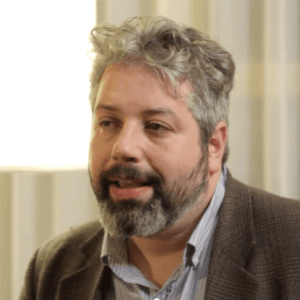
Jim Thomas:
Thomas has been actively campaigning on biotechnology issues since 1994 when he co-founded the “New Luddites” in the UK – a network of activists questioning corporate agendas in science and technology. He co-founded GEN (the UK’s network of groups against genetically engineered crops) and was a campaigner for Greenpeace International on GMO and food issues. He worked with grassroots movements on several continents to help advise and establish GMO campaigns elsewhere. In 2002, he began working with ETC Group and as Program Director. He is lead author on several ETC publications about emerging technologies. He is a co-founder of the Synbiowatch.org initiative and of the International Civil Society Working Group on Synthetic Biology.
Funding
The most recent financial statement that the ETC Group provides is from 2014. It lists funding from:
- Lillian Goldman Charitable Trust $220,000
- CS Fund
- Core Funding $164,000
- Project/Travel support $24,200
- Project/Staff in Africa $42,376
- Oxfam Novib $151,988
- Oxfam Novib SD=HS $86,621
- Syn-Energene $69,078
- Other (including donations of $9,632) $47,739
- New Venture Fund (IFAAES) $29,572
- Heinrich Boell Foundation $26,181
- Biodiversidad Magazine $5,851


